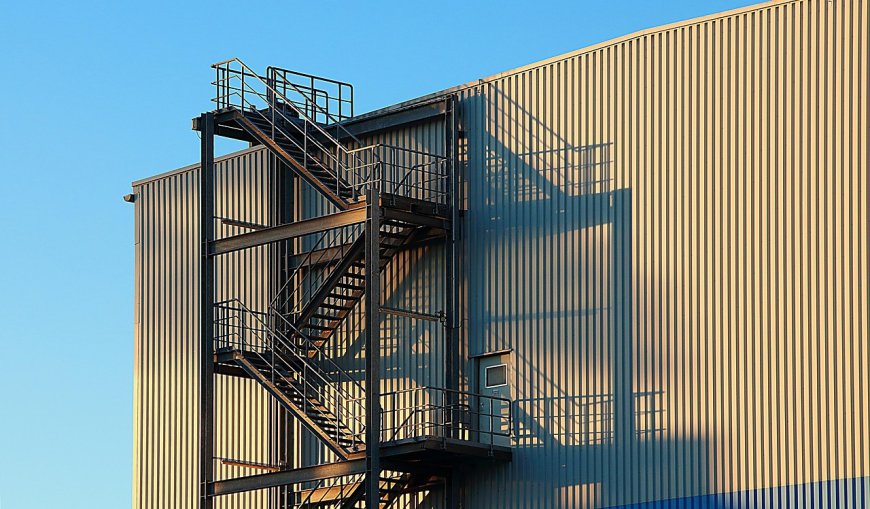Why Ready-Made Factories Are Accelerating Industrial Growth in Saudi Arabia
Discover why ready-made factories are driving industrial growth in Saudi Arabia, supporting Vision 2030, and creating opportunities for logistics companies.

Saudi Arabia is transforming into a global industrial hub. Ready-made factories play a key role in this shift. These pre-built facilities help businesses start operations quickly. They support the Kingdoms Vision 2030 goals of economic diversification and sustainable growth. This article explores why ready-made factory in Aaudi Arabia is driving industrial growth, how they benefit logistics companies, and what this means for Saudi Arabias future.
What Are Ready-Made Factories?
Ready-made factories are pre-constructed industrial buildings. They come equipped with essential infrastructure like power, water, and logistics connections. Businesses can lease or buy these facilities and start operations almost immediately. In Saudi Arabia, these factories are part of the National Industrial Development and Logistics Program (NIDLP). The program aims to boost manufacturing and support logistics companies.
These facilities are located in industrial cities like Riyadh, Dammam, and Jeddah. They cater to industries such as petrochemicals, pharmaceuticals, and food processing. Ready-made factories reduce setup time and costs, making them attractive for both local and foreign investors.
How Ready-Made Factories Support Vision 2030
Vision 2030 is Saudi Arabias plan to reduce oil dependency. It focuses on growing non-oil sectors like manufacturing and logistics. Ready-made factories align with this vision by offering quick-start solutions for businesses. Since 2016, the number of industrial facilities has grown by 60%, reaching 11,549 in 2023. The National Industrial Strategy aims for 36,000 factories by 2035.
These factories attract investments worth billions. In 2023, 1,379 industrial licenses were issued, with investments over $21.5 billion. This growth creates jobs and boosts the economy. Logistics companies benefit by handling the transport of raw materials and finished goods for these factories.
Key Benefits for Industrial Growth
- Faster Setup: Ready-made factories cut setup time from years to months. Businesses can start production quickly.
- Cost Savings: Pre-built facilities reduce construction costs. Companies save on building and infrastructure expenses.
- Strategic Locations: Factories are located near ports and highways. This helps logistics companies streamline supply chains.
- Sustainability: Many factories use energy-efficient designs. This supports Saudi Arabias green initiatives.
Why Logistics Companies Are Essential for Ready-Made Factories
Logistics companies are vital to the success of plug and play factories Saudi Arabia. These facilities rely on efficient supply chains to move goods. Logistics firms transport raw materials to factories and deliver products to markets. Saudi Arabias strategic location between Europe, Asia, and Africa makes it ideal for logistics operations.
The NIDLP supports logistics companies by improving infrastructure. New industrial cities and logistics hubs, like those in Riyadh and the Eastern Province, enhance connectivity. In 2023, industrial exports reached $149 billion, showing the importance of logistics in moving goods globally.
Logistics companies also benefit from advanced technologies. Industry 4.0 tools like AI and robotics improve efficiency. For example, smart factories use real-time data to optimize production. Logistics firms use similar technologies to track shipments and reduce delays.
Opportunities for Logistics Companies
- Increased Demand: More factories mean more goods to transport. Logistics companies see higher demand for their services.
- Global Reach: Saudi Arabias focus on exports opens new markets for logistics firms.
- Technology Integration: Logistics companies can adopt AI and IoT to improve tracking and delivery.
Key Industries Benefiting from Ready-Made Factories
Ready-made factories support a range of industries. These sectors drive Saudi Arabias industrial growth and create opportunities for logistics companies. Here are the main industries benefiting:
- Petrochemicals: Saudi Arabia leads in petrochemical production. Ready-made factories produce plastics and fertilizers, needing logistics for global distribution.
- Pharmaceuticals: The Kingdom aims to localize medicine production. Logistics companies transport medical supplies safely.
- Food Processing: Growing demand for packaged foods boosts this sector. Logistics firms ensure fresh delivery to consumers.
- Advanced Manufacturing: Factories for aerospace and electronics use cutting-edge tech. Logistics companies handle delicate components.
Challenges and Solutions for Ready-Made Factories
While light industrial units for rent offer many benefits, there are challenges. These include labor shortages and regulatory hurdles. However, Saudi Arabia is addressing these issues effectively.
Labor Shortages: The Kingdom relies on foreign workers for skilled roles. To address this, Saudi Arabia invests $50 billion annually in education. This creates a skilled local workforce for factories and logistics companies.
Regulatory Hurdles: Complex licensing can slow down operations. The government has streamlined processes through the Ministry of Industry and Mineral Resources. In 2023, 63 new licenses were issued in January alone.
Sustainability Concerns: Industrial growth must align with green goals. Ready-made factories use solar and wind energy to reduce emissions. Logistics companies adopt electric vehicles to support this trend.
How Ready-Made Factories Attract Global Investors
Saudi Arabia offers incentives to attract investors to ready-made factories. The Saudi Industrial Development Fund (SIDF) provides loans covering up to 75% of project costs. Investors in less-developed areas get longer loan terms. These incentives make it easier for businesses to set up.
Global companies like Dell, HP, and Lenovo are exploring factory sites in Saudi Arabia. The Kingdoms low-tariff status and strategic location appeal to these firms. Logistics companies benefit by supporting these international players with efficient supply chains.
The Standard Incentives Programme, announced in January 2025, offers $2.19 billion to support industrial growth. This funding helps businesses adopt advanced technologies and sustainable practices.
The Future of Ready-Made Factories in Saudi Arabia
The future of ready-made factories is bright. By 2035, Saudi Arabia aims to have 36,000 factories, with 4,000 fully automated. These smart factories will use AI and robotics to boost efficiency. Logistics companies will play a key role in connecting these factories to global markets.
The Kingdom is also investing in green technologies. Factories will use clean energy sources like solar and green hydrogen. This aligns with global sustainability trends and attracts eco-conscious investors.
For businesses, ready-made factories offer a chance to grow fast. For logistics companies, they create demand for efficient transport solutions. Together, these efforts position Saudi Arabia as a global manufacturing and logistics hub.
Conclusion: Why Ready-Made Factories Matter
Ready-made factories are transforming Saudi Arabias industrial landscape. They support Vision 2030 by driving economic diversification and job creation. These facilities offer businesses a fast, cost-effective way to start operations. Logistics companies benefit from increased demand and improved infrastructure. With government support and global investment, industrial leasing solutions Riyadh are set to accelerate Saudi Arabias growth for years to come.
Want to explore opportunities in Saudi Arabias industrial sector? Contact a logistics company or the Ministry of Industry and Mineral Resources for guidance on setting up in a ready-made factory.






































